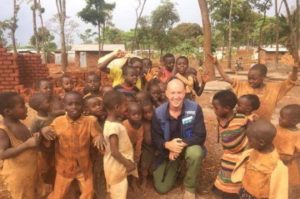New approach needed to address refugee crisis
A new approach is needed to tackling the world’s refugee situation, according to an Australian recently appointed to a key leading role at the UN’s High Commission for Refugees.
Andrew Harper AM has this week taken up a role in Geneva to head up the UNHCR’s innovation and best practice.

Andrew Harper
He has just completed a five-year posting managing a camp of a million refugees in Jordan and has been working with refugees since the 1990s when he worked in Turkey during the first gulf war for UNHCR.
Mr Harper said a new approach to the refugee crisis was desperately needed.
“We’ve never been confronted with so many people in need. And how we’ve done things in the past are no longer working,” he said.
“People are dying, wars are not being resolved and fewer people are going back to their homes.
“I’ve come back to headquarters, to try to change the organisation to better adapt to what’s happening in the world,” he said.
Mr Harper grew up in the southern NSW city of Wagga Wagga, before taking up work with the UN’s High Commission for Refugees in the 1980s.
“It’s our job at UNHCR is to make sure that people are provided with the necessary feeling of safety… People get moved to the refugee camp and then you have to look at all their needs and that ranges from putting them in shelter to providing them with blankets, food, health care, education, water,” he said.
“So they need everything you would imagine would be required to keep a population alive. At the moment we’re winning, but it is an incredibly difficult task when more and more people come across the border.”
This month he has visited refugee camps in Burundi, Tanzania and the Democratic Republic of Congo.
“One of the things we were looking at is how can we provide fuel in a community rather than cutting down trees, which is not sustainable,” Mr Harper said.
The current global refugee population increases at a rate of about 1,500 people an hour, every hour and there are currently more than 60 million people displaced – more than even at the end of WWII.
“World peace is just not going to happen. It’s never going to happen. We’ve just got to try to mitigate the suffering as best we can,” he said bluntly.
“Unfortunately I think this is a fairly secure job that I’ve got because I can’t see the refugee situation is going to be resolved. But it’s my job to make sure my team is enthusiastic and committed to making a difference,” Mr Harper said.
“Now I’ve probably got a bit more time to take a step back and look at things more strategically.
“Now we have to look at what’s going to be the next conflict, and find solutions before they appear,” he said.
Mr Harper said Australia was a lucky country, and its residents are in the privileged position of being able to help.
“As Australians we think we can go school, we complain if things don’t work,” he said.
“These people don’t have any safety or security, access to water, access to electricity, schooling — the very things we take for granted.
“We have to see how we can help them, because that’s what community’s about,” he said.
Mr Harper’s message to Australian communities receiving refugees was to work hard on welcoming the new arrivals.
“Give them the respect, give them the time, because what they’ve left behind is something we cannot imagine,” he said.
Laurie Nowell
AMES Australia Senior Journalist












